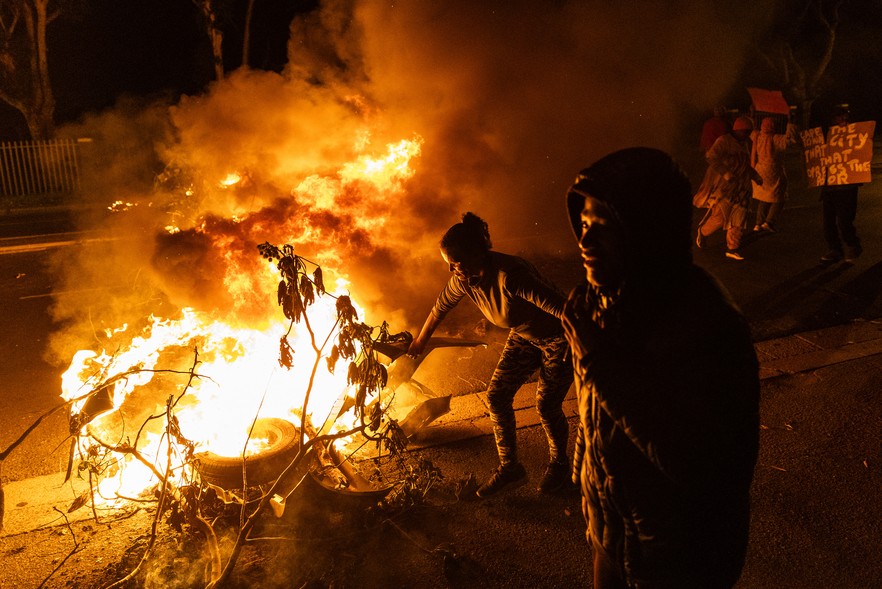
15 September 2025
Protesters from the 18th Avenue, Gate 7, and Olympic informal settlements blocked busy Voortrekker Road near Maitland cemetery and brought peak-hour traffic to a standstill on Monday to demand they be given water and electricity. Photos: Ashraf Hendricks
Scores of protesters blocked busy Voortrekker Road near Maitland cemetery and brought peak-hour traffic to a standstill on Monday. They demanded they be given water and electricity.
The group from the 18th Avenue, Gate 7, and Olympic informal settlements in ward 56 started burning tyres, branches, and other debris before 5am. They also claimed they are unfairly targeted by local police.
A protester throws a portable toilet containing human faeces.
“We need electricity, water and houses and proper toilets” said Carmen Adolf, an Olympic Park resident. Adolf has has been staying there for over 20 years.
This is not the first time residents have blocked Voortrekker Road. In May 2024, protesters from Gate 7 protested, demanding water and toilets. The settlements are on privately owned land, according to the City.
Police and protesters stand-off in Voortrekker Road on Monday.
On Monday, the protesters’ main demand was water. They burned a mobile toilet and threw human faeces onto the street from a portable toilet. They overturned a shipping container to block the road. Police tried to stop them with two stun grenades.
In white spraypaint across the road, protesters wrote: “We need water. We need power. We need houses”. Some waved placards saying “Basic needs” and “Away with oppressing”.
Protesters say they have to collect water from a nearby informal wellpoint or Wingfield – a site where the state is housing a group of refugees in a large tent. There has long been tension among the residents of the surrounding informal settlements.
A child collects water before 6am from an informal wellpoint in the bushes near their informal settlement. In the distance, protesters had been burning tyres and debris in protest.
From behind a line of police with riot shields and guns, ward councillor Cheslyn Steenberg addressed a few protesters in a bid to quell tensions. He accepted the group’s list of demands. He refused to speak to reporters.
Community activist Philip Nyalungu said that they were tired of having their numerous attempts to communicate with the City ignored. “If we didn’t protest, [the ward councillor] wouldn’t have come here”. He said that the councillor’s actions made people “very very angry”.
City spokesman Luthando Tyhalibongo said it will look into the issues raised by the protesters. But because the settlements are on privately-owned land, the City’s options are limited.
Tyhalibongo added that the City plans to spend more than R8-billion on human settlements and service delivery in informal settlement areas over the next three years.
“Numerous communities are demanding services, but currently the City is unable to cater for these unplanned settlements as existing recognised informal settlements are prioritised based on available resources,” he said.
Community leaders say they have tried to meet with officials from the City of Cape Town for months to discuss the poor living conditions at the informal settlements.